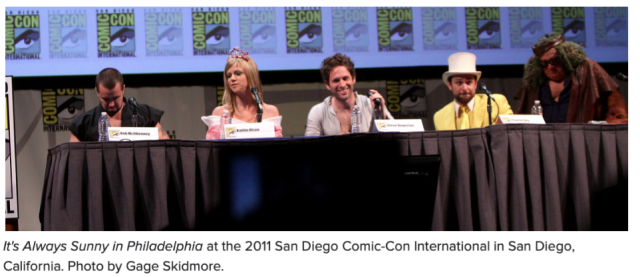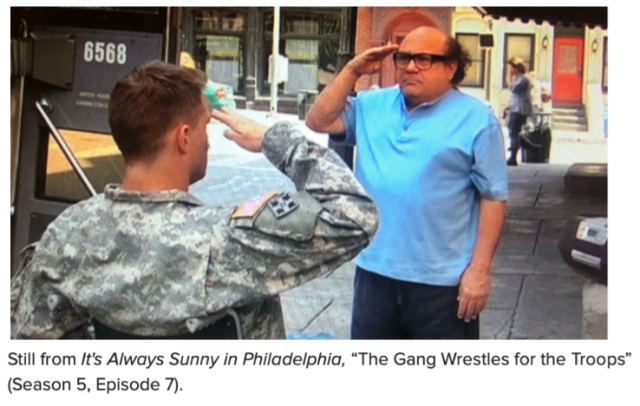There is a show that I have been recently introduced to which has taken up a lot of space in my mind: It’s Always Sunny in Philadelphia. This show is highly controversial, and deservedly so in my opinion. While I have only seen the first six seasons, in this article, I would like to highlight one of the episodes that I find particularly interesting, and analyze it in the context of politics and culture. My readers know that I am a fan of both good and bad art, and I think this show contains an odd balance of both.

As a disclaimer before I even start this article: I do not condone any of the actions or behaviors exhibited by the characters in this show, and I can only evaluate the show based on the content that I have seen so far!
It’s Always Sunny in Philadelphia is an American sitcom, premiering in 2005. The series follows the misadventures of Charlie, Mac, Dennis, Dee, and Frank, otherwise known as “the gang,” who own and work at an unpopular Irish-theme dive bar in Philadelphia. Glenn Howerton (one of the actors and creators of the show) said in a 2007 interview with the New York Times, that the concept of the show was simply to focus on “a group of friends who care so little for each other.”
A little bit of background: The creators of the show arrived in Hollywood and found themselves unemployed, struggling to get cast in any sort of acting job. They shot a couple of extended skits with a cheap camcorder and absolutely no budget, using their apartments as the sets. The friends pitched the project to a couple networks, with the contingency that if the show was to be made, they would have to be the writers, producers, and stars. Surprisingly, they succeeded.
Despite its humble origins, It’s Always Sunny in Philadelphia currently has 16 seasons, making it the longest running live-action American sitcom. In December 2020, the series was approved for additional seasons, which means that there will soon be 18. I am definitely not the first to write about this series, as it has received critical acclaim and accrued a large cult following.
It’s Always Sunny in Philadelphia is kind of insane—but also very intriguing with its dark comedy. As I mentioned, the series revolves around the activities of “the gang,” who honestly, should not be friends. I feel that I also must mention that each member of the gang is a narcissistic sociopath, each almost representational of a different social vice. This sitcom is a far departure from typical American shows with sympathetic and loveable protagonists such as How I Met Your Mother, The Office, Seinfeld, and Friends.
I feel that the best way to explain this departure, and thus the social value of the show, is through a case study of one of their crazier episodes: “The Gang Wrestles for the Troops.”
The episode opens with the gang watching a Hulk Hogan wrestling match while drinking at Paddy’s Pub. All of a sudden, Dee receives a message from a guy she’s been chatting with online, who turns out to be a soldier returning home from Iraq. The gang believes that any soldier who would date Dee has lost all dignity and hope, which leads Mac to claim that this is indicative of a larger social problem that people are no longer proud to be American “like they were in the ‘80s.” Of course, it becomes the resolve of this narcissistic and impulsive group to solve America’s lack of nationalism and lack of support for the troops by participating in their own Hulk Hogan-esque wrestling match.
While Mac, Dennis, and Charlie are setting up the wrestling match, Dee meets up with the returning soldier for the first time only to discover that he is in a wheelchair. Apparently disgusted by his disability, she tells him that she is not the girl he is looking for and bolts. Meanwhile, Frank Reynolds, played by Danny DeVito, shows up and salutes the soldier, inviting him to the wrestling match and gifting him a pair of jorts to thank him for his service.

The day of the wrestling match arrives, and the gang has come up with quite the line-up. The match features “Cricket,” a former-priest-turned-homeless-man, fighting as “America’s most hated terrorist: the Tali-Bum.” Cricket is dressed as an offensive caricature of a Middle Eastern man in robes and a turban. Cricket will face Charlie, Mac, and Dennis, poorly dressed as bald eagles in camouflage shorts and painted-on abs, fighting as “the Birds of War.”
Once the match starts, the “Tali-Bum” quickly defeats all the “Birds of War” by blowing sand in their eyes. We think the match is over, but Danny DeVito’s character runs into the ring as a wrestler he dubs the “Trash Man” and takes out Cricket by throwing a garbage can at him. As he falls to the floor, DeVito poses as Rocky while the crowd cheers. The screen turns black and the credits roll with Hulk Hogan’s theme song, “Real American” playing in the background.
The premise of the episode is deceptively simple, but in reality it provides a raw analysis of social vices as they exist today. Within the first two minutes of the show, Charlie, Mac, Dennis, and Frank had already demonstrated their deep misogyny against women as they criticized Dee for being too ugly to date a hero such as an American soldier. In the next five minutes, Dee shows her shallowness and prejudice as she pretends not to know the soldier just because he has a visible disability.
The application of Hulk Hogan and wrestling to supporting the troops shows how malleable and easily-influenced the gang is and how elementary their grasp on their American identity is. The fact that they earnestly believe that they can easily resolve a nationwide disregard and lack of support for soldiers through the first thing they saw on television that morning is absolutely crazy, but outside of the episode itself, the audience is forced to reconsider contemporary movements and efforts of the same nature. Many celebrations and holidays that revolve around supporting the troops actually prioritize entertainment value over aid and philanthropy. The gang only puts effort into the event first for their own entertainment, and then to stroke their own egos as they involve themselves as wrestlers with fake abs.
By watching a band of careless individuals with no intention of educating themselves on what they presume to know so much about, the show holds up a mirror to society, making us voyeurs of our own flaws and exposing our own lack of real action. Arguably, the only sincere act of service for soldiers performed in the whole episode was when Frank presented Dee’s love interest with jorts and a salute, which is so absurd and nihilistic it hurts.
The last five minutes of this episode is perhaps the most indicative of the absurdist political satire that frequents the series. The gang escalates (or reduces) all political and social issues to either extreme ends of the spectrum. In this episode, that means their wrestling match had to be a microcosm of global conflict as America metaphorically wrestled the Middle East, generalized as terrorists. The offensiveness of the gang’s idea and the costumes is so obvious that no one can condone their behavior, perhaps even modern extremists themselves. As strange as it might sound, the way that the gang creates polarization amongst themselves on social issues actually could be helpful in facilitating dialogue and room for debate in real life about those issues. As the members of the gang are constantly proven wrong about convictions they hold so surely, we are likewise forced to question our own. The extremeness of the gang’s political beliefs on either side also sheds light on the fact that usually the solution is somewhere in the middle-ground, but real-life American politics seldom deal in moderation and compromise.
Finally, as the “Trash Man” poses triumphantly over defeated “Tali-Bum” and “Birds of War,” the episode rolls credits, and the audience is provided with a potent suggestion that there can be no real winner in violence, only garbage cans and Danny DeVito. Likewise, we are reminded that there will be no resolution and no learning on the part of the gang. In the spirit of Seinfeld’s “No hugging, no learning” rule, they will continue to be wrong about a different socio-political issue next episode, as if nothing happened.
As a college student who is about to transition to the “real world,” this show is comforting in its discomfort. We live in incredibly uncertain social and political times; it can be cathartic to witness a group of idiots as they try to navigate the same precarious minefields of society that we also must tiptoe through. Additionally, the introduction of difficult concepts through humor may make learning more digestible to modern audiences. The use of satire and irony to expose negative social and political attitudes is one of the oldest and most effective tools for understanding society. Each member of the gang is a blatant antithesis of correct human behavior. By placing them under a microscope of wacky scenarios of their own design, it becomes more possible for broader audiences to understand society’s collective psyche, deepest values and instincts, and structures of power and inequality. I would perhaps compare the goals of the satire to Voltaire’s Candide, or the parody to George Orwell’s Animal Farm.
I hope that this article leads you to be consumed by It’s Always Sunny in Philadelphia just like I am. Question everything! Praise Danny DeVito!


